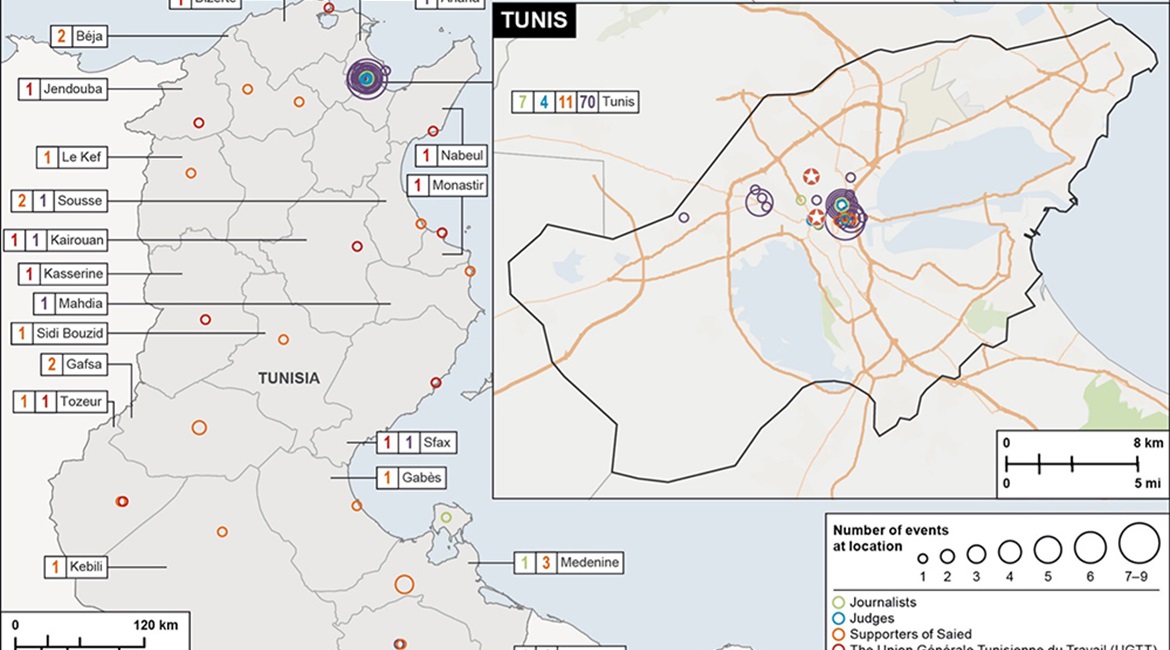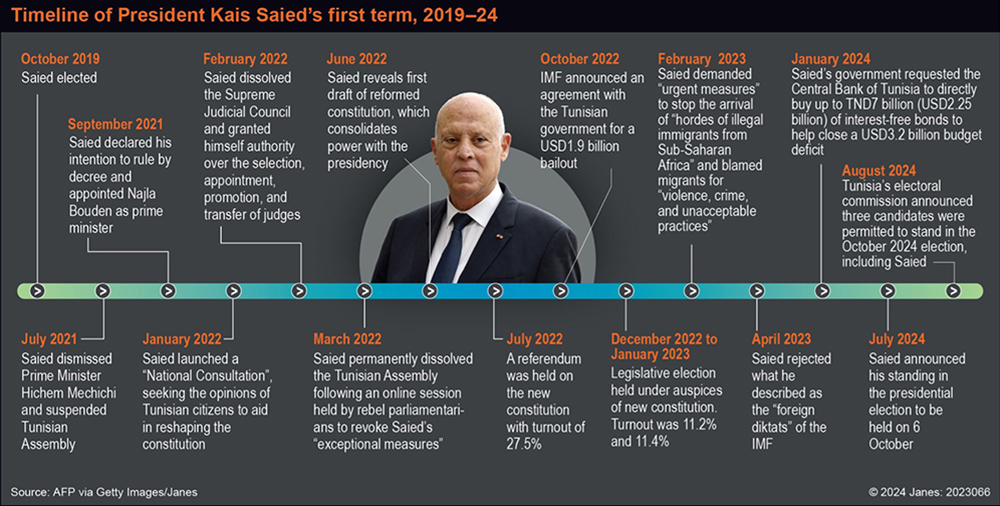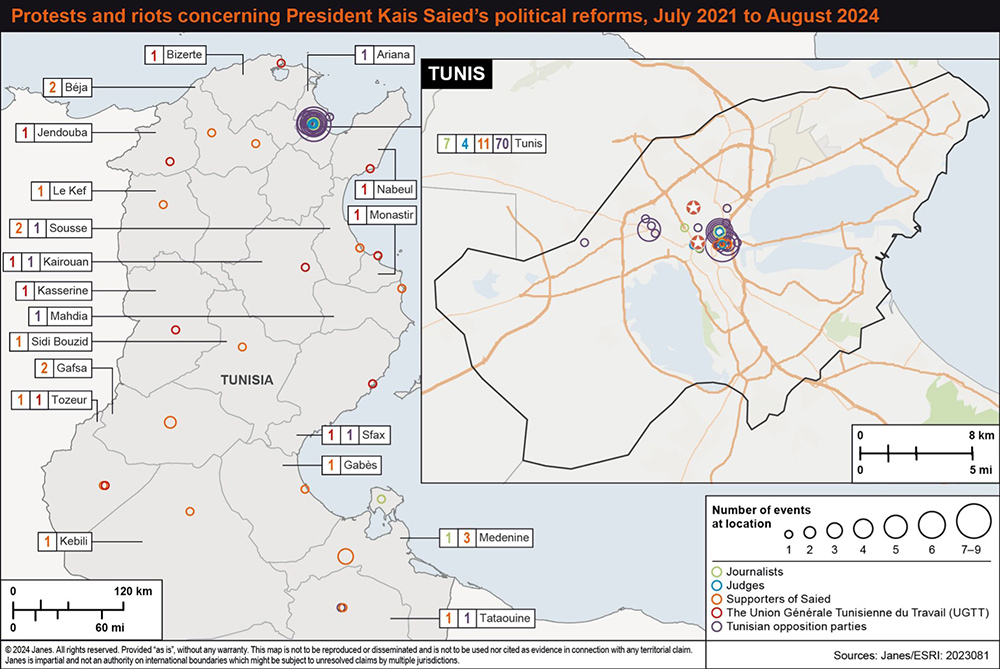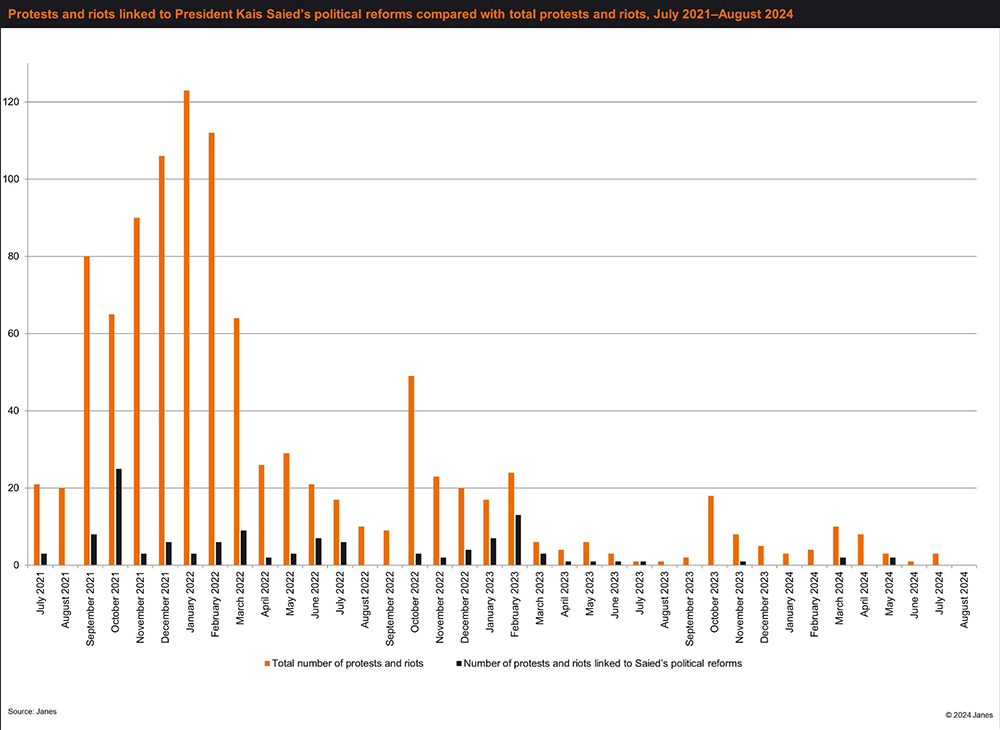
Date Posted: 02-Sep-2024
Author: James Trigg, London
Tunisia has been in a protracted political crisis since July 2021. James Trigg assesses the risks that surround the October 2024 presidential election, including the prospect for public unrest, communal tensions, and politically motivated violence.
Key points
- Intelligence requirement/question: What are the main risks surrounding the October 2024 presidential election in Tunisia and what effect could they have on national stability?
- Significance: Saied's pursuit of political reforms has divided Tunisians, with his critics, including opposition politicians and civil society actors, accusing Saied of a coup. The election represents a crucial milestone in his campaign, and a potential focal point for frustration and discontent with his government
- Assessment and outlook: Janes assesses that there is a realistic possibility of popular anger and discontent with Saied's political reforms manifesting in significant protests, predominantly across Tunis during the election
- These are likely to escalate in geographic scope only if they conflate with the more localised concerns of Tunisians, which have been the predominant cause for protests outside of Tunis
- Janes assesses that there is a realistic possibility that Saied and his government will invoke populist narratives, such as the threats to Tunisian social stability posed by unnamed individuals hoarding foodstuffs, the influence of foreign powers and Sub-Saharan migrants, and the risks these pose to communal tensions, including the risk of sectarian violence
Situation
Since July 2021 when President Kais Saied dismissed then Prime Minister Hichem Mechichi and suspended the Tunisian Assembly, the president's programme of political reforms has significantly altered Tunisia's political landscape, centralising power beneath the office of the presidency.
Assuming consolidated powers under Article 80 of the 2014 Tunisian constitution, Saied formally dissolved the parliament and the Supreme Judicial Council (SJC). Following the dissolution of the SJC, Saied appointed himself as the authority for appointing judges.
In April 2022 Saied announced he would reform Tunisia's election commission, installing “a new seven-member panel with three judges and an information technology specialist” and thereby increasing the president's influence over the body. Saied has also rewritten the constitution and held new legislative elections between December 2022 and January 2023 under its auspices.
 Timeline of Saied's first term, 2019–24. (Janes)
Timeline of Saied's first term, 2019–24. (Janes)
With the October 2024 presidential election approaching, 11 rival presidential candidates have criticised “arbitrary restrictions” such as delays in the receipt of “a document certifying that they have no criminal record”, which hampered their registrations, according to an August 2024 report by Reuters.
Furthermore, critics of Saied have highlighted the arrests of journalists, lawyers, and opposition politicians under Decree 54, signed by Saied in September 2022 to criminalise “false information with the aim of undermining public safety” and “inciting hate speech”. Other rivals, such as the leader of the Ennahda party, Rached Ghannouchi, have been arrested for receipt of “foreign contributions” and “incitement”, according to a February 2024 report by Al Jazeera.
| Saied's supporters | Saied's opponents |
|---|---|
| · 25 July Movement · Disenfranchised youth · Tunisian Nationalist Party (TNP) · Tunisian security forces | · Al Amal (“Hope”) party* · Citizens against the Coup* · Dignity Coalition* · Ennahda* · Free Destourian Party · Movement Party* · National Union of Tunisian Journalists · Tunisian Judges' Association · Union Generale Tunisienne du Travail (UGTT) |
| Note: *These parties also operate together as the National Salvation Front of Tunisia (NSFT) | |
Protests and riots risks
Between July 2021 and August 2024 Janes Events recorded 122 protests and riots directly related to Saied's political reforms. Of these, a significant majority (92/122, 75.4%) occurred in Tunis, with Saied's various political opponents organising most of these events (70/92, 76.1%).
Saied has also mobilised his supporters to protest in favour of his regime, although Janes Events recorded far fewer events (26/122, 21.3% and 11/92, 12% in Tunis specifically).
In October 2021 approximately 8,000 Tunisians took to the streets of Tunis to declare their support for Saied following his assumption of extraordinary powers. Smaller demonstrations took place in February 2022 after Saied's suspension of the SJC, and in May 2022 as the president's online ‘National Consultation' concerning a new constitution entered its final days.
 Protests and riots concerning President Kais Saied's political reforms, July 2021 to August 2024. (Janes/ESRI)
Protests and riots concerning President Kais Saied's political reforms, July 2021 to August 2024. (Janes/ESRI)
Outside of Tunis, the number of protests and riots pertaining specifically to the president's political reforms drops significantly. The 122 events represent a small percentage (122/1012, 12.1%) of overall protest and riot activity recorded by Janes Events in the same period. Beyond popular outrage at Saied's altering of Tunisia's political structure, protest and riot events in Tunisia have centred on local concerns such as water scarcity, payment of salaries, and unemployment.
Communal tensions risk
Beyond organised political protests, Janes assesses that there is a realistic possibility of communal tensions increasing across Tunisia before and immediately after the October 2024 election.
Throughout his first term, Saied has drawn upon key narratives to explain Tunisia's deteriorating socio-economic conditions, which have very likely contributed to past instances and outbreaks of communal tensions and violence.
In March 2022 Saied issued Decree No 14 (2022), which was drafted “to combat speculation and monopolies on goods and commodities”, according to an August 2023 report by the US Library of Congress. Saied blamed “monopolists, particularly those in the grain distribution sector”, of exacerbating shortages and price rises among basic foodstuffs, even those controlled by Tunisian state subsidies to the populace.
The president also used this narrative in February 2023, following the arrests of notable critics, including the head of Tunisian radio station Mosaique FM, Noureddine Boutar, the former Minister of Justice and senior member of the Ennahda party, Noureddine Bhiri, and the political activist and lawyer, Lazhar Akremi. According to comments made by Saied in a video released by the Tunisian presidency's social media on 14 February 2023, among those arrested were individuals accused of contributing to food shortages “by distributing foodstuff and raising their prices”.
 Protest and riot events concerning Saied's political reforms compared with total protest and riot events in Tunisia, July 2021 to August 2024. (Janes)
Protest and riot events concerning Saied's political reforms compared with total protest and riot events in Tunisia, July 2021 to August 2024. (Janes)
In a separate February 2023 speech, Saied demanded “urgent measures” to stop the arrival of “hordes of illegal immigrants from Sub-Saharan Africa”.
Blaming unidentified parties for benefiting financially from migration, Saied accused migrants of “violence, crime, and unacceptable practices”. This speech preceded a nationwide police operation against illegal migrants across Tunisia, and also saw “Sub-Saharan families being harassed on the streets, evicted from their homes, and arbitrarily detained”, according to a May 2024 report by Deutsche Welle.
The Tunisia director for Human Rights Watch (HRW), Salsabil Chellali, warned that “acts of xenophobic violence against Sub-Saharan Africans …[were] … surging across Tunisia” following Saied's speech, according to a March 2023 report by Bloomberg.
The July 2023 stabbing of a Tunisian man in Sfax by three suspects accused of being Cameroonian, led to hundreds of residents demanding the eviction of all illegal migrants. Some migrants were attacked by the crowds according to a July 2023 report by France24.






